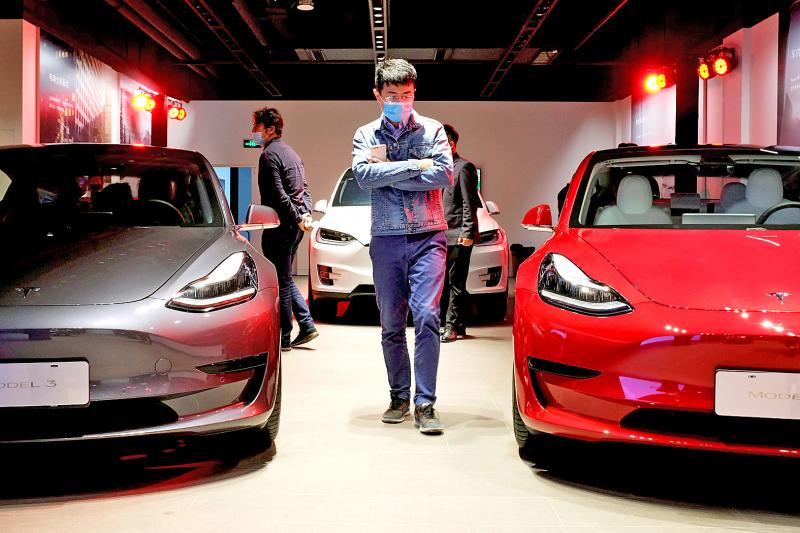Tesla Inc temporarily halted some production at its auto assembly plant in California because of problems with its supply chain, but work has begun to resume, CEO Elon Musk told employees in an e-mail on Thursday.
“We are experiencing some parts supply issues, so took the opportunity to bring Fremont production down for a few days to do equipment upgrades and maintenance,” Musk said in an all-staff message seen by Bloomberg.
The factory was “back up and running as of yesterday,” and would rapidly ramp up to full production of Model 3 and Model Y cars “over the next several days,” he said.

Photo: Reuters
Backlogs at ports and severe snowstorms affecting ground transport have caused some of the supply-chain issues, a person familiar with the matter said.
Representatives for the Palo Alto, California-based electric-vehicle maker did not respond to messages seeking comment.
Bloomberg reported earlier on Thursday that some production had been paused at the factory. Staff on a Model 3 production line in Fremont were told their line would be down from Monday through Sunday next week, although some Model 3 employees were back in the factory on Wednesday, said another person familiar with the matter, who asked not to be identified because the information is private.
While production-line outages are not unusual for automakers, they cost the companies revenue.
Tesla has said capacity issues at ports and semiconductor shortages are affecting its supply chain.
Chief financial officer Zach Kirkhorn said on an earnings call last month that the company is working to manage the disruptions, adding that they “may have a temporary impact.”
“We are not overly concerned this supply chain/factory disruption changes the overall delivery trajectory for 1Q and 2021,” Dan Ives, a Wedbush Securities analyst with a neutral rating on Tesla’s stock, wrote in a research note published on Thursday.
Musk’s e-mail encouraged employees to recommend friends to come join Tesla as the company “soon” resumes a second model S and X shift due to “high demand.”
The S/X production lines are “almost done retooling and will be aiming for max production next quarter,” he said.
Tesla shares dropped 8.1 percent to US$682.22 on Thursday, and were little changed in late trading. The stock has declined 3.3 percent so far this year.
The California plant is still the most important part of Tesla’s vehicle-production base, with capacity to make an estimated 600,000 vehicles a year.
The affected workers were told they would be paid for Monday and Tuesday, and not paid for Sunday through Wednesday next week. They were advised to take vacation time, if they had it.
Musk has also opened a plant near Shanghai, and is constructing facilities outside Berlin and in Texas.
Tesla has cut the price of its various models 14 times in markets including China, Japan and France this year, said GLJ Research LLC founder Gordon Johnson, who has a sell rating on the stock.
“When considering Tesla had excess inventory in the fourth quarter of 2020, and has never been able to sell-out its production capacity, we see the company as currently demand constrained, rather than production constrained,” Johnson wrote in a note earlier this week.

Taiwan Semiconductor Manufacturing Co (TSMC, 台積電) last week recorded an increase in the number of shareholders to the highest in almost eight months, despite its share price falling 3.38 percent from the previous week, Taiwan Stock Exchange data released on Saturday showed. As of Friday, TSMC had 1.88 million shareholders, the most since the week of April 25 and an increase of 31,870 from the previous week, the data showed. The number of shareholders jumped despite a drop of NT$50 (US$1.59), or 3.38 percent, in TSMC’s share price from a week earlier to NT$1,430, as investors took profits from their earlier gains

In a high-security Shenzhen laboratory, Chinese scientists have built what Washington has spent years trying to prevent: a prototype of a machine capable of producing the cutting-edge semiconductor chips that power artificial intelligence (AI), smartphones and weapons central to Western military dominance, Reuters has learned. Completed early this year and undergoing testing, the prototype fills nearly an entire factory floor. It was built by a team of former engineers from Dutch semiconductor giant ASML who reverse-engineered the company’s extreme ultraviolet lithography (EUV) machines, according to two people with knowledge of the project. EUV machines sit at the heart of a technological Cold

Taiwan’s long-term economic competitiveness will hinge not only on national champions like Taiwan Semiconductor Manufacturing Co. (TSMC, 台積電) but also on the widespread adoption of artificial intelligence (AI) and other emerging technologies, a US-based scholar has said. At a lecture in Taipei on Tuesday, Jeffrey Ding, assistant professor of political science at the George Washington University and author of "Technology and the Rise of Great Powers," argued that historical experience shows that general-purpose technologies (GPTs) — such as electricity, computers and now AI — shape long-term economic advantages through their diffusion across the broader economy. "What really matters is not who pioneers

TAIWAN VALUE CHAIN: Foxtron is to fully own Luxgen following the transaction and it plans to launch a new electric model, the Foxtron Bria, in Taiwan next year Yulon Motor Co (裕隆汽車) yesterday said that its board of directors approved the disposal of its electric vehicle (EV) unit, Luxgen Motor Co (納智捷汽車), to Foxtron Vehicle Technologies Co (鴻華先進) for NT$787.6 million (US$24.98 million). Foxtron, a half-half joint venture between Yulon affiliate Hua-Chuang Automobile Information Technical Center Co (華創車電) and Hon Hai Precision Industry Co (鴻海精密), expects to wrap up the deal in the first quarter of next year. Foxtron would fully own Luxgen following the transaction, including five car distributing companies, outlets and all employees. The deal is subject to the approval of the Fair Trade Commission, Foxtron said. “Foxtron will be